Welcome to our free classical music site

Do you write about classical music? Are you a blogger? Want to team up with Classical Connect? Send us a message, let's talk!

Do you write about classical music? Are you a blogger? Want to team up with Classical Connect? Send us a message, let's talk!
May 28, 2018. Six composer and two pianists. Six composers were born this week: Isaac Albéniz and Erich Wolfgang Korngold on May 29th, the former in 1860, the latter in 1897. Marin Marais, the Frenchman – on May 31st of 1656, Georg Muffat – on June 1st of 1653. We didn’t mention Muffat’s nationality, as it’s hard to determine: he was born to a Scottish father and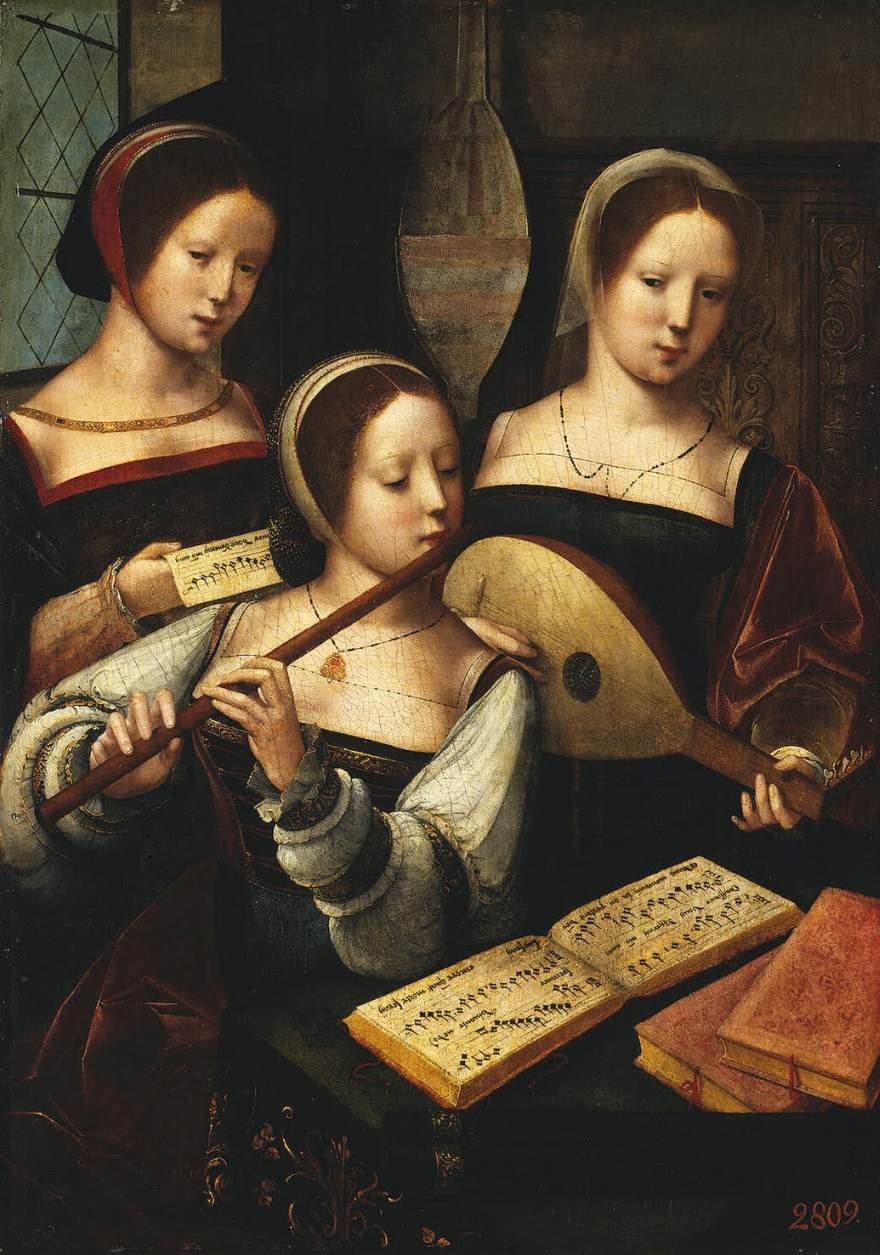 French mother in the Dutchy of Savoy, which back then was an independent state with Turin as its capital but now is part of France. He studied in Paris for six years and then moved to Alsace, which, formerly part of the Holy Roman Empire, was conquered by the French King Louis XIII in 1639. Even though under the formal control of France, most of Alsace was independent, German-speaking and Lutheran. Later in his life, Muffat lived in Vienna, Prague, Salzburg and Italy. He spent the last 20 years of his life in Passau, Bavaria. We could call Muffat a Savoyard, a Frenchman or even a German, as some encyclopedias do. Here’s his Concerto Grosso in G minor “Dulce Somnium” (Sweet Sleep), written by Muffat in 1701. While in Rome, Muffat studied with Arcangelo Corelli, one of the early developers of the Concerto Grosso form. It was practically unknown in the German lands till Muffat’s time. The performers in this recording are the ensemble Musica Aeterna Bratislava under the direction of Peter Zajíček.
French mother in the Dutchy of Savoy, which back then was an independent state with Turin as its capital but now is part of France. He studied in Paris for six years and then moved to Alsace, which, formerly part of the Holy Roman Empire, was conquered by the French King Louis XIII in 1639. Even though under the formal control of France, most of Alsace was independent, German-speaking and Lutheran. Later in his life, Muffat lived in Vienna, Prague, Salzburg and Italy. He spent the last 20 years of his life in Passau, Bavaria. We could call Muffat a Savoyard, a Frenchman or even a German, as some encyclopedias do. Here’s his Concerto Grosso in G minor “Dulce Somnium” (Sweet Sleep), written by Muffat in 1701. While in Rome, Muffat studied with Arcangelo Corelli, one of the early developers of the Concerto Grosso form. It was practically unknown in the German lands till Muffat’s time. The performers in this recording are the ensemble Musica Aeterna Bratislava under the direction of Peter Zajíček.
Also on June 1st we celebrate the birthday of Mikhail Glinka, the first truly original Russian composer. Glinka was born in 1804; at that time the Russian music scene, quite lively in St-Petersburg, was dominated by the Italians and Italian-influenced composers. Two operas by Glinka, A Life for the Tsar (called Ivan Susanin during the Soviet period) and Ruslan and Lyudmila, changed it all. Here’s the famous Overture to Ruslan and Lyudmila. The Leningrad Philharmonic Orchestra is led by its principal conductor of 50 years, Evgeny Mravinsky. And finally, Sir Edward Elgar was born on June 2nd of 1857. As we confessed some years ago, we’re not as much in love with Sir Edward’s music as the British public seems to be. Still, without a doubt Jacqueline du Pré’s performance of Elgar’s Cello concerto is a masterpiece, both in terms of music itself and the interpretation. We’ll write more about it on Elgar’s next birthday.
And now to two pianists. Grigory Ginzburg, a Russian-Soviet-Jewish pianist, was born in Nizhny Novgorod on May 29th of 1904. He studied at the Moscow Conservatory with Alexander Goldenweiser. In 1927 he participated in the First Chopin Piano Competition and received the 4th prize (Lev Oborin was the winner). Ginzburg taught at the Conservatory from the age of 25. His repertory was very 19-century, with many transcriptions and salon pieces, but his musicianship was impeccable. Many consider Ginsburg the last pianist in Liszt’s tradition. Here’s Grigory Ginzburg playing Chopin's Berceuse in a live 1959 recording.
Considered one of the finest pianists of his generation, Zoltán Kocsis, who died of cancer at the age of 64 less than two years ago, was a very different musician. Born on May 30th of 1952 in Budapest, he loved playing music of the 20th century: he recorded all piano works of Béla Bartók. Kocsis was also a conductor, having founded, with Iván Fischer, the Budapest Festival Orchestra. Here’s Bartók’s Piano Sonata (1926), recorded by Kocsis in 1996. Permalink
May 21, 2018. Nilsson and Wagner. Four days ago, on May 17th, the music world celebrated the 100th anniversary of Birgit Nilsson, the great Wagnerian soprano. And tomorrow, May 22nd, is the 205th anniversary of the composer himself. Nilsson was born Märta Birgit Svensson in a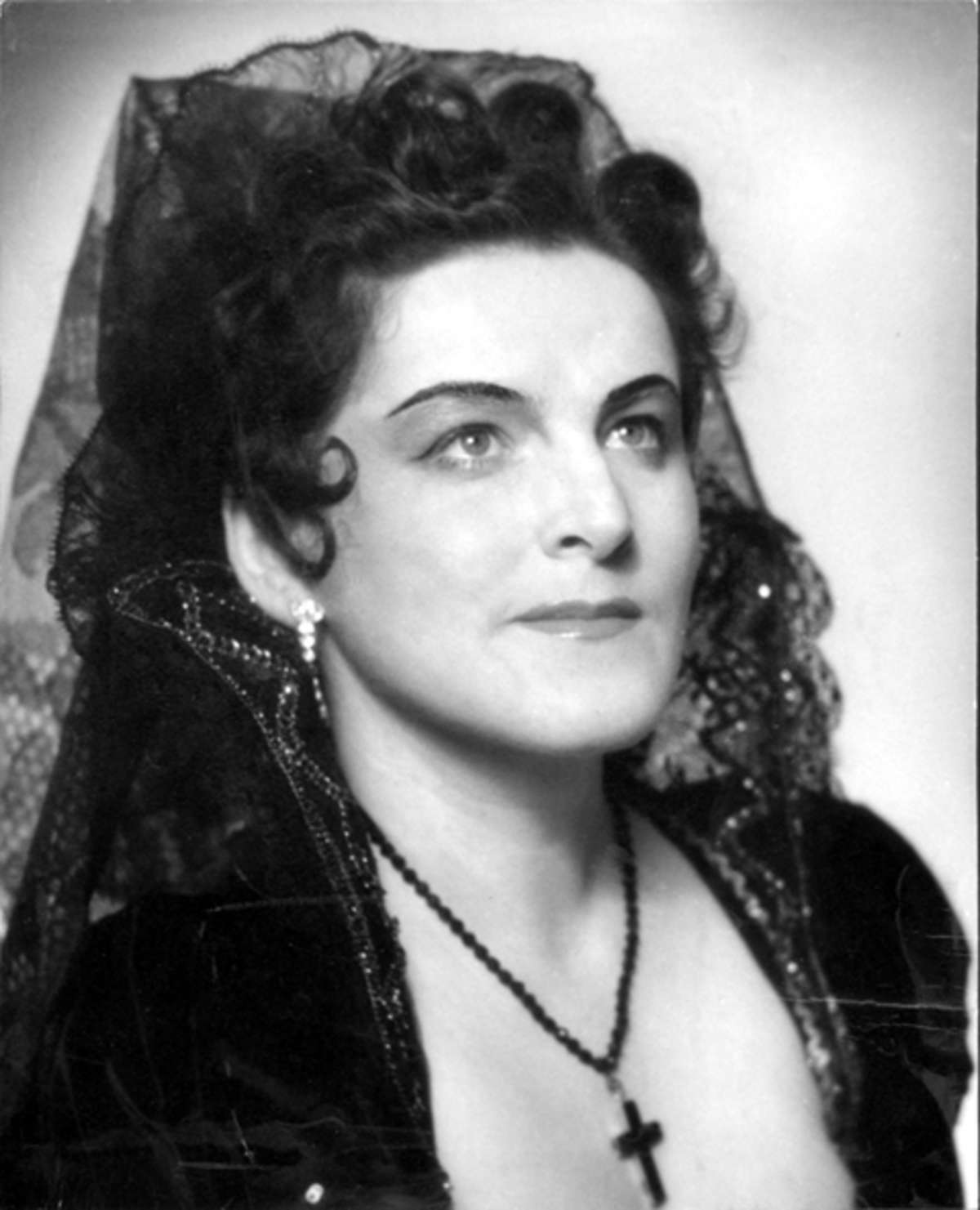 tiny village of Västra Karup in the southwestern part of Sweden. She started singing early, sung in the local church choir and later was admitted to the Royal Academy of Music in Stockholm (she didn’t appreciate her voice teachers and considered herself to be self-taught). She debuted at the Royal Swedish Opera in 1946 and in a short time developed a large repertoire, singing in Italian, Russian and German operas, all in Swedish. In 1953 she performed, for the first time, at the Vienna Opera. The next year she sung her first Wagner role, that of Elsa in Lohengrin, at Bayreuth, and the first Brünnhilde, her future calling card role, in the complete Ring cycle at the Bavarian State Opera. Bayreuth became one of her favorite places, she sung there till 1970. In addition to Brünnhilde, her roles there included Sieglinde in Die Walküre and Isolde. By the end of the 1950s she had sung, to great acclaim, at Covent Garden, the San-Francisco Opera, La Scala and the Metropolitan Opera. Other major opera houses followed – Chicago, Paris, Berlin. She established herself as the finest Wagnerian soprano of the generation, able to carry the mantel of Kirsten Flagstad. Her tone was pure, the sound brilliant, even from the top to the bottom of the register; the size of her voice was enormous. Listen, for example, to her astounding Liebestod from Tristan un Isolde, recorded at the Bayreuth Festival in 1966. Karl Böhm conducts the Orchestra of the Bayreuth Festival (here).
tiny village of Västra Karup in the southwestern part of Sweden. She started singing early, sung in the local church choir and later was admitted to the Royal Academy of Music in Stockholm (she didn’t appreciate her voice teachers and considered herself to be self-taught). She debuted at the Royal Swedish Opera in 1946 and in a short time developed a large repertoire, singing in Italian, Russian and German operas, all in Swedish. In 1953 she performed, for the first time, at the Vienna Opera. The next year she sung her first Wagner role, that of Elsa in Lohengrin, at Bayreuth, and the first Brünnhilde, her future calling card role, in the complete Ring cycle at the Bavarian State Opera. Bayreuth became one of her favorite places, she sung there till 1970. In addition to Brünnhilde, her roles there included Sieglinde in Die Walküre and Isolde. By the end of the 1950s she had sung, to great acclaim, at Covent Garden, the San-Francisco Opera, La Scala and the Metropolitan Opera. Other major opera houses followed – Chicago, Paris, Berlin. She established herself as the finest Wagnerian soprano of the generation, able to carry the mantel of Kirsten Flagstad. Her tone was pure, the sound brilliant, even from the top to the bottom of the register; the size of her voice was enormous. Listen, for example, to her astounding Liebestod from Tristan un Isolde, recorded at the Bayreuth Festival in 1966. Karl Böhm conducts the Orchestra of the Bayreuth Festival (here).
In addition to Wagner, she excelled in the operas of Richard Strauss (many consider Electra to be her greatest achievement). She was also a great Turandot (she was invited to La Scala to open the 1958 - 1959 season with the Puccini opera; Nilsson later said that it was the biggest events in her life). But today we’re celebrating Nilsson and Wagner, so here is another recording, made in 1954, also in Bayreuth. It’s the aria Einsam in trüben Tagen – Lonely, in troubled days (I prayed to the Lord) – from Act 1 of Lohengrin. The orchestra, as always is that of the Bayreuth Festival (Orchester der Bayreuther Festspiele); it’s assembled each year just for the Festival; the best musicians are invited, mostly from German orchestras. In this recording the conductor is another eminent German, Eugen Jochum. And finally, the famous Nun zäume dein Ross (Now bridle thy horse), from Act 2 of Die Walküre. In this 1961 recording, Birgit Nilsson is Brünnhilde, George London – Wotan. The London Symphony Orchestra is conducted by Erich Leinsdorf (here).Permalink
May 14, 2018. Monteverdi, Curzon, François. On May 15th of last year we celebrated the 450th anniversary of the great Italian composer Claudio Monteverdi. We’ve also written about him on many previous occasions, for example here and here. Even though he’s famous as the “father of the opera,” Monteverdi worked in practically all musical genres popular at the end of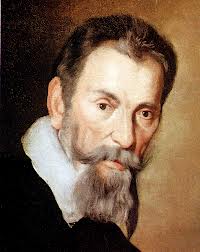 the 16th – early 17th centuries. He wrote sacred music (vespers and motets), but his madrigals are especially beautiful. The seventh book of madrigals (altogether he wrote nine “books” or collections) was written in Venice, where Monteverdi moved in 1613 after a long and highly productive period at the Mantuan court. In Venice he held a prestigious position of the maestro di cappella at San Marco. The seventh book was published in 1619 and contains 28 madrigals. Within the book, the music varies significantly. Compare, for example, Ohimè dov'è il mio ben, dov'è il mio core? (Alas! Where is my beloved, where is my heart?) with its beautiful duet of two sopranos (here), with Sinfonia – Tempro la cetra (I tune my lyre), which opens the book (here) orChiome d’oro (Golden hair), here. Monteverdi continued composing for many years, publishing two more books of madrigals and several operas, most of them lost. He died in 1643 at the ripe age of 76.
the 16th – early 17th centuries. He wrote sacred music (vespers and motets), but his madrigals are especially beautiful. The seventh book of madrigals (altogether he wrote nine “books” or collections) was written in Venice, where Monteverdi moved in 1613 after a long and highly productive period at the Mantuan court. In Venice he held a prestigious position of the maestro di cappella at San Marco. The seventh book was published in 1619 and contains 28 madrigals. Within the book, the music varies significantly. Compare, for example, Ohimè dov'è il mio ben, dov'è il mio core? (Alas! Where is my beloved, where is my heart?) with its beautiful duet of two sopranos (here), with Sinfonia – Tempro la cetra (I tune my lyre), which opens the book (here) orChiome d’oro (Golden hair), here. Monteverdi continued composing for many years, publishing two more books of madrigals and several operas, most of them lost. He died in 1643 at the ripe age of 76.
Two prominent pianists were born on May 18th: Clifford Curzon in 1907 and Samson François in 1924. Curzon, one of the finest British pianists of the 20th century, was born Clifford Siegenberg; his Jewish father changed the family name at the outbreak of the Great War. Clifford studied at the Royal Academy of Music and in 1928 went to Berlin to study with Arthur Schnabel. He also studied with Nadia Boulanger and Wanda Landowska. Curzon’s career flourished in the 1930s, when he toured Europe and the United States. The war affected Curzon as it did so many musicians, but he resumed concert playing at the end of the war. In 1952, together with Joseph Szigeti, William Primrose and Pierre Fournier he formed a highly successful Edinburgh Festival Piano Quartet. Curzon suffered from stage fright and almost always played from the score. He was also highly critical of his own studio recordings. Here, for example, is a recording of Mozart’s Piano Concertos No. 20, K. 466 made in 1970, with the English Chamber Orchestra under the direction of Benjamin Britten. Curzon didn’t approve of it and it was issued only after his death in 1982.
Samson François was a French pianist and composer. His family moved from one country to another: Samson was born in Frankfurt, where his father worked at the consulate, and by the age of six he was living in Italy, where Pietro Mascagni gave him several lessons. Eventually François settled in Paris where he studied with Alfred Cortot, Marguerite Long and Yvonne Lefebure. In 1943 he won the first Marguerite Long - Jacques Thibaud Competition. François was famous for his (often idiosyncratic) performances of the music of Debussy, Fauré and Ravel, and also the 19th century Romantics. Here’s his recording of Maurice Ravel’s Gaspard de la nuit. It was made in 1958.Permalink
May 7, 2018. Stamitz, Paisiello and more. The unfortunate coincidence of two birthdays, those of Brahms and Tchaikovsky, the former on this day in 1833, the latter – in 1840, creates a perennial conundrum: how to write about two very important composers of the 19th century, so different as to render any comparison meaningless, both deserving multiple entries. Over the years we’ve tried different tacks, such as here, but this year we’ll simply overlook both and write about several other significant musical figures whose birthdays we usually ignore for the sake of the two masters.
Carl Stamitz was born on May 8th, 1745, in Mannheim. His father, Johann, an important early classical composer and violinist, was appointed to the court of the Electoral Palatinate several years prior and was Carl’s first music teacher. The Elector maintained an orchestra that was famous around Europe; Carl joined it at the age of 17. Among the court musicians there were several composers who are now collectively known as Mannheim School. While not very famous nowadays, these composers, and Carl Stamitz among them, influenced both Franz Joseph Haydn, Mozart, and even the young Beethoven. In 1770 Carl left the orchestra and began a career of a traveling virtuoso: he played violin, viola, and viola d'amore. He traveled all around Europe, playing concerts in Paris, London, Saint Petersburg, and many principalities of Germany. Eventually he moved to Jena, and died there, impoverished, in 1801. Here’s Symphony in D-major "La Chasse" written in 1772. London Mozart Players are conducted by Matthias Bamert.
Giovanni Paisiellois one of those composers, who, very popular at their time, are very rarely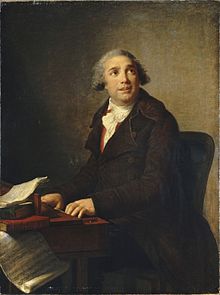 performed these days. Paisiello was born in a small town of Roccaforzata, in the Taranto province of Apulia on May 9th of 1740. During his long life (he died in Naples on June 5th, 1816) he was a favorite of several monarchs, including Catherine the Great of Russia and Napoleon Bonaparte. Famous for his operas, he contended with such composers as Pergolesi, Cimarosa, and Rossini. When Rossini dared to put to music Le Barbier de Séville, the same Beaumarchais’s play which Paisiello did 30 years earlier, fans of Paisiello created a riot. These days, Rossini’s opera remains one of the most popular in the whole opera repertoire whereas Paisiello’s opera is a rarity. Actually, it’s quite interesting, full of lovely melodies. Here’s proof: the aria Saper bramate, bella il mio nome, from Paisiello’s Il barbiere. Figaro is the wonderful Rolando Panerai, Rosina is sung by the late Graziella Sciutti. Renato Fasano is conducting the Virtuosi di Roma. Stanley Kubrick, the great movie director, also loved this piece: he used it in the gambling scene of his masterpiece, “Barry Lindon.” This puts Paisiello in the company of Handel, Schubert, Bach and Vivbaldi. And one more word on our Rosina: Graziella Sciutti was renowned for her "soubrette" characters. One of her best was Zerlina in the famous recording of Don Giovanni with Elisabeth Schwarzkopf, Joan Sutherland, Giuseppe Taddei and Piero Cappuccilli. Here she sings Batti, batti, o bel Masetto. The conductor in that production was Carlo Maria Giulini, who was born on May 9th of 1914.
performed these days. Paisiello was born in a small town of Roccaforzata, in the Taranto province of Apulia on May 9th of 1740. During his long life (he died in Naples on June 5th, 1816) he was a favorite of several monarchs, including Catherine the Great of Russia and Napoleon Bonaparte. Famous for his operas, he contended with such composers as Pergolesi, Cimarosa, and Rossini. When Rossini dared to put to music Le Barbier de Séville, the same Beaumarchais’s play which Paisiello did 30 years earlier, fans of Paisiello created a riot. These days, Rossini’s opera remains one of the most popular in the whole opera repertoire whereas Paisiello’s opera is a rarity. Actually, it’s quite interesting, full of lovely melodies. Here’s proof: the aria Saper bramate, bella il mio nome, from Paisiello’s Il barbiere. Figaro is the wonderful Rolando Panerai, Rosina is sung by the late Graziella Sciutti. Renato Fasano is conducting the Virtuosi di Roma. Stanley Kubrick, the great movie director, also loved this piece: he used it in the gambling scene of his masterpiece, “Barry Lindon.” This puts Paisiello in the company of Handel, Schubert, Bach and Vivbaldi. And one more word on our Rosina: Graziella Sciutti was renowned for her "soubrette" characters. One of her best was Zerlina in the famous recording of Don Giovanni with Elisabeth Schwarzkopf, Joan Sutherland, Giuseppe Taddei and Piero Cappuccilli. Here she sings Batti, batti, o bel Masetto. The conductor in that production was Carlo Maria Giulini, who was born on May 9th of 1914.
Three more composers were also born this week. Anatol Liadov, a Russian miniaturist, and two Belle Époque composers, Jules Massenet, the author of many operas, of which Manon and Werther are probably the most famous, and another Frenchman, Gabriel Fauré. We’ll get back to them another time.Permalink
April 30, 2018. Alessandro Scarlatti and Marcel Dupré. We love Alessandro Scarlatti: he was аcomposer of great talent and these days is clearly underappreciated. Yes, things are changing, and baroque opera is being staged more often. And of course, the great Cecilia Bartoli did much to popularize some of his music, as well as the new generation of counter-tenors, Philippe Jaroussky among them..jpg) Still, we’d like to hear much more of Alessandro’s music, instead of the standard ration dispersed by the classical music radio stations. Alessandro Scarlatti was born in Palermo, on May 2nd of 1660. Here’s what we wrote about him a year ago, so let’s just listen to a couple of his pieces. In addition to operas, Scarlatti wrote a number of oratorios. Musicologists view these oratorios as a substitute for opera; most of Scarlatti’s oratorios were composed in Rome where the Pope was strongly opposed to opera performances. We’ll hear two excerpts from the oratorio Il Sedecia, re di Gerusalemme. It was written in Rome in 1705. Scarlatti was living in Rome since 1702. It was his second visit to the city (he first arrived in Rome at the age of 12 with his family and stayed there for 10 years before moving to Naples). Even though he was under the patronage of Cardinal Ottoboni, Scarlatti wasn’t employed by him directly; instead, he would serve, usually for a short time before being fired, as maestro di cappella at different churches. Eventually Ottoboni made the unhappy Scarlatti one of his “ministers,” but even that didn’t last long as a year later Ottoboni replaced him with Arcangelo Corelli. Operas, Scarlatti’s favorite genre, were virtually prohibited by Pope Clement XI. Scarlatti wrote five operas for Ferdinando de' Medici, then the Grand Prince of Florence but that relationship also ended rather soon, as Ferdinando decided that he likes Giacomo Antonio Perti’s operas better.
Still, we’d like to hear much more of Alessandro’s music, instead of the standard ration dispersed by the classical music radio stations. Alessandro Scarlatti was born in Palermo, on May 2nd of 1660. Here’s what we wrote about him a year ago, so let’s just listen to a couple of his pieces. In addition to operas, Scarlatti wrote a number of oratorios. Musicologists view these oratorios as a substitute for opera; most of Scarlatti’s oratorios were composed in Rome where the Pope was strongly opposed to opera performances. We’ll hear two excerpts from the oratorio Il Sedecia, re di Gerusalemme. It was written in Rome in 1705. Scarlatti was living in Rome since 1702. It was his second visit to the city (he first arrived in Rome at the age of 12 with his family and stayed there for 10 years before moving to Naples). Even though he was under the patronage of Cardinal Ottoboni, Scarlatti wasn’t employed by him directly; instead, he would serve, usually for a short time before being fired, as maestro di cappella at different churches. Eventually Ottoboni made the unhappy Scarlatti one of his “ministers,” but even that didn’t last long as a year later Ottoboni replaced him with Arcangelo Corelli. Operas, Scarlatti’s favorite genre, were virtually prohibited by Pope Clement XI. Scarlatti wrote five operas for Ferdinando de' Medici, then the Grand Prince of Florence but that relationship also ended rather soon, as Ferdinando decided that he likes Giacomo Antonio Perti’s operas better.
In this recording of the duet Caro figlio from Il Sedecia, Anna, the wife of the King Zedekiah (Sedecia), a soprano role, is sung by Virginie Pochon and Ismaele, her son, – by the countertenor Philippe Jaroussky. Notice that his part often lies above the soprano’s. And from the same oratorio, here is Isamele’s aria Caldo sangue, except that in this recording it’s performed by Cecilia Bartoli. Two wonderful, if very different, interpretations.
Marcel Dupré, the French organist and composer, was born on May 3rd of 1886 in Rouen. His father was an organist and a friend of Aristide Cavaillé-Colli, the greatest French organ-maker of the time (organs by Cavaillé-Colli still perform in scores of French churches, starting from the Notre Dame de Paris, Saint-Sulpice, Sainte-Trinité and Sacré-Cœur in Paris to numerous churches and concert halls across Europe and South America, for example, in the Great Hall of the Moscow Conservatory). Dupré entered the Paris Conservatory in 1904, where he studied with famous organ players and composers such Charles-Marie Widor and Louis Vierne. A professor of organ performance at the Paris Conservatory since 1926, in 1934 he succeeded Vidor as the organist at the church of Saint-Sulpice, whose Great Organ is widely considered the best instrument ever built by Cavaillé-Colli. Here’s Dupré’s Prelude and Fugue, Op. 7 no. 3 in G minor. It’s performed byJulian Bewig on a modern instrument, an organ built in 2003 by the firm Fischer & Krämer for the church of St. Marien in Emsdetten, Germany.Permalink
April 23, 2018. Prokofiev. Sergei Prokofiev was born on this day in 1891. Two years ago we celebrated his 125th anniversary and last year we again wrote about him in some detail, so today we’ll focus on some of Prokofiev’s music, especially the piece that so far has been missing from our library. Piano sonata no. 5 is unusual in two respects: it’s the only sonata written outside of Russia,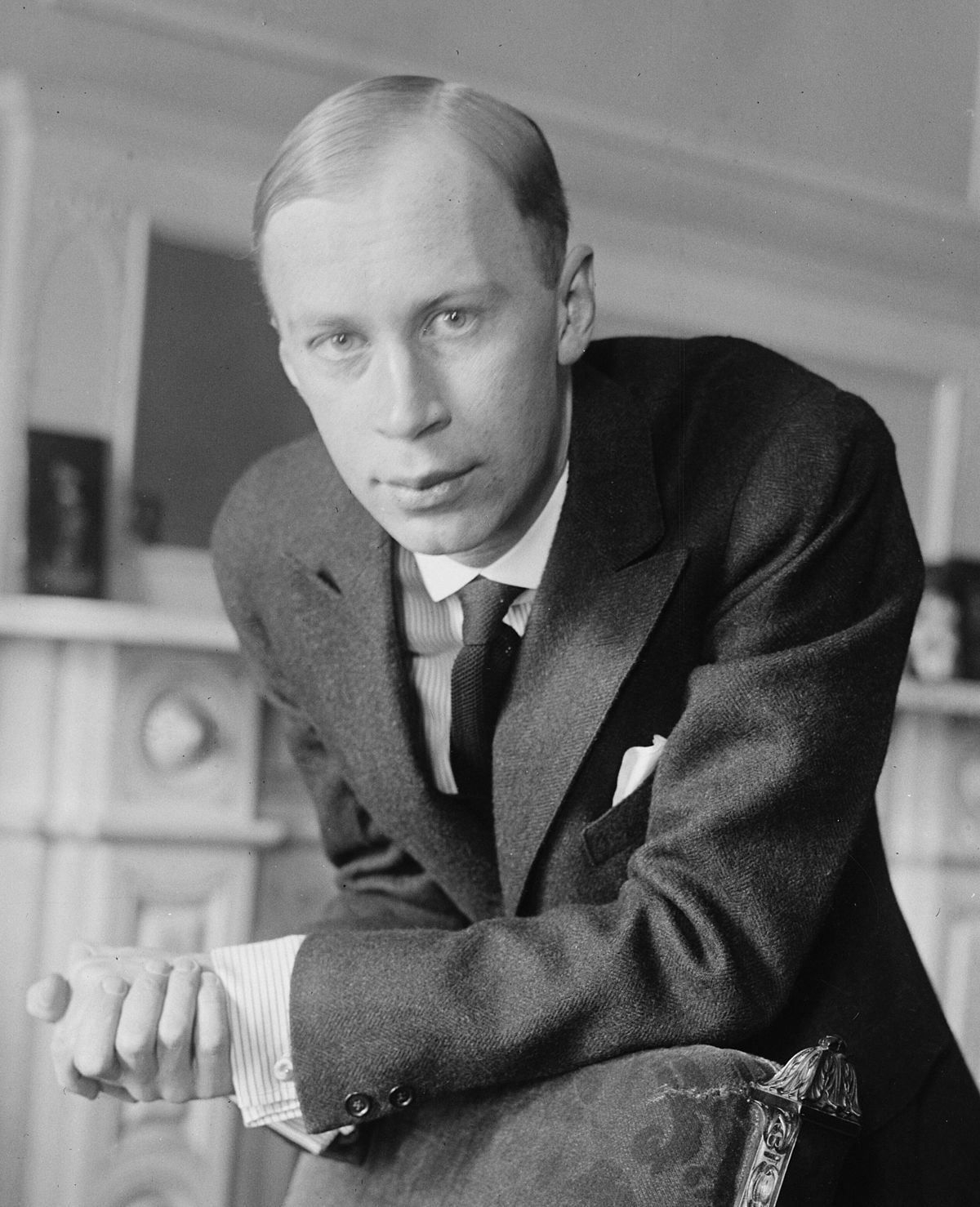 and it’s also the only sonata to have two opus numbers. The first version, op. 38, was composed in 1923. After spending two not very successful years in the US, Prokofiev returned to Europe in 1920. By 1922 he settled in the town of Ettal in the Bavarian Alps (Ettal is a place where the mad King Ludwig II, Wagner’s benefactor, built one of his folly palaces). During that time Prokofiev spent much of his time working on the opera The Fiery Angel, which he had started working on in 1919 and wouldn’t finish till 1927 (the opera was never staged during Prokofiev’s lifetime; the first concert performance took place in 1953 in Paris, the theatrical premier took place in La Fenice, Venice, in 1955). While in Ettal, Prokofiev, a virtuoso pianist, toured many countries, thus earning a living. Also in Ettal, in October of 1923, Prokofiev married the Spanish singer Lina Llubera. Soon after they moved to Paris, and it was there that Prokofiev played the Sonata no. 5 for the first time. The reception was lukewarm, which Prokofiev acknowledged himself. But clearly, he thought better of the music than most listeners and music critics, as he returned to the Sonata in 1952. It’s difficult to imagine more different circumstances: in 1923 Prokofiev, 32 years old and full of energy was free, traveling around Europe, working with Diaghilev, arguing with Stravinsky, about to be married for the first time – and in 1952, only 61 but very ill, he was living in the suburbs of Moscow, suffering official prosecution for “formalism,” with many of his works officially banned, and Lina, his first wife, was arrested and in the Gulag. During his final years Prokofiev composed little new music but concentrated on reworking some of the earlier compositions, his Sonata no. 5, which acquired the new opus number, 135, and Symphony no. 2, which, like the sonata, wasn’t received well on its premier in Paris in 1925. He completed reworking of the piano sonata but never did much work on the Symphony. Prokofiev died on March 5th of 1953, the same day as Stalin. The notice of his death was published two weeks later, so as not to detract people from the main “tragic event.”
and it’s also the only sonata to have two opus numbers. The first version, op. 38, was composed in 1923. After spending two not very successful years in the US, Prokofiev returned to Europe in 1920. By 1922 he settled in the town of Ettal in the Bavarian Alps (Ettal is a place where the mad King Ludwig II, Wagner’s benefactor, built one of his folly palaces). During that time Prokofiev spent much of his time working on the opera The Fiery Angel, which he had started working on in 1919 and wouldn’t finish till 1927 (the opera was never staged during Prokofiev’s lifetime; the first concert performance took place in 1953 in Paris, the theatrical premier took place in La Fenice, Venice, in 1955). While in Ettal, Prokofiev, a virtuoso pianist, toured many countries, thus earning a living. Also in Ettal, in October of 1923, Prokofiev married the Spanish singer Lina Llubera. Soon after they moved to Paris, and it was there that Prokofiev played the Sonata no. 5 for the first time. The reception was lukewarm, which Prokofiev acknowledged himself. But clearly, he thought better of the music than most listeners and music critics, as he returned to the Sonata in 1952. It’s difficult to imagine more different circumstances: in 1923 Prokofiev, 32 years old and full of energy was free, traveling around Europe, working with Diaghilev, arguing with Stravinsky, about to be married for the first time – and in 1952, only 61 but very ill, he was living in the suburbs of Moscow, suffering official prosecution for “formalism,” with many of his works officially banned, and Lina, his first wife, was arrested and in the Gulag. During his final years Prokofiev composed little new music but concentrated on reworking some of the earlier compositions, his Sonata no. 5, which acquired the new opus number, 135, and Symphony no. 2, which, like the sonata, wasn’t received well on its premier in Paris in 1925. He completed reworking of the piano sonata but never did much work on the Symphony. Prokofiev died on March 5th of 1953, the same day as Stalin. The notice of his death was published two weeks later, so as not to detract people from the main “tragic event.”
Here’s the Piano Sonata no. 5 in it’s final edition. It’s performed by Boris Berman (no relation to the great pianist Lazar Berman). Boris Berman was born in Moscow and studied at the Moscow Conservatory with Lev Oborin. He emigrated from the Soviet Union in 1973. Boris Berman is the first pianist to record all of the piano works by Sergey Prokofiev.Permalink